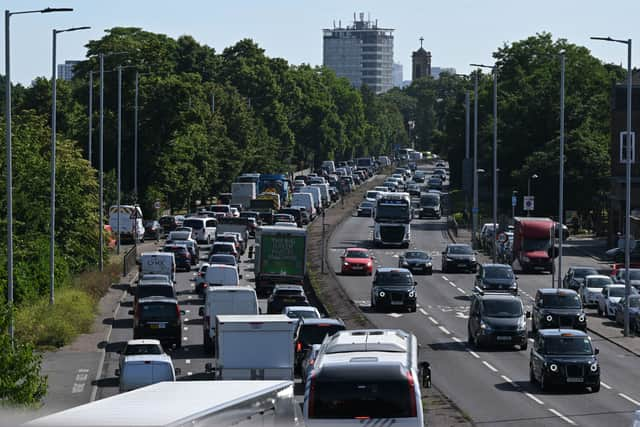One in five London car drivers ditching vehicle for short-distance trips, data shows
and live on Freeview channel 276
More than 20% of London’s drivers have cut down on short-distance car trips in the last two years, with the cost of fuel prompting many to choose other forms of transport.
According to data compiled by Opinium for servicing and repairs company Kwik Fit, around 960,000 drivers in the capital, 22%, have reduced the use of their car for journeys of one-to-two miles.
Advertisement
Hide AdAdvertisement
Hide AdA larger percentage of the city’s drivers, 26% (around 1.1 million), said they often use their car for short-distance trips, but that they intend on looking to other transport options in the future.
While the cost of living accounts for the most common factor pushing London drivers to make the move (33%), wanting to use more active travel modes to improve fitness (26%), the environmental impact (19%) and lack of car parking spaces (19%) were also recorded in the data.


Nationally, the research showed that, of the 20 million drivers who regularly use their car for journeys of between one and two miles, 34% (6.9 million) want to switch to other travel methods.
In London, 17% said they want to use a bike for journeys under 1.5 miles, compared to 13% across the country.
Advertisement
Hide AdAdvertisement
Hide AdCommenting on the data, Mark Slade, managing director of Kwik Fit, said: “This research shows that there are many reasons why drivers are looking for different modes of travel for short journeys, and we can support them through removing some of the barriers when it comes to increased cycle use.
“In addition, a growing number of our customers who operate vehicle fleets have been asking if we can support their expanding cargo bike operations, which are increasingly being used for short urban journeys.”
Cycling in London
Will Norman, London’s walking and cycling commissioner, recently told The News Agents podcast that “more than two-thirds of all car journeys in London could be walked, cycled or scooted in under 20 minutes”.
He continued: “Now, that’s not me saying all of them should be, if you’re disabled or if you’re going to, I don’t know, B&Q and picking up some patio flagstones, a car would be a better bet for that.
Advertisement
Hide AdAdvertisement
Hide Ad“But a lot of those journeys could be made by other alternatives.”
The capital’s cycling infrastructure has expanded signficantly in recent years. Between 2016 and 2022, London’s cycleways grew from 90km to nearly 350km, work Simon Munk, campaigns manager at London Cycling Campaign, said was “vital” in getting more people on their bikes.
However, he added: “There are still far too many areas without any protected cycle tracks on main roads, too many gaps between routes and too many local politicians still failing to deliver on cycling as a key way of helping Londoners ditch cars whenever possible for climate, inactivity, road danger, pollution, congestion and many other reasons.
“We need every London borough to start delivering more for walking, cycling and public transport to help residents ditch cars when possible.”
Comment Guidelines
National World encourages reader discussion on our stories. User feedback, insights and back-and-forth exchanges add a rich layer of context to reporting. Please review our Community Guidelines before commenting.
